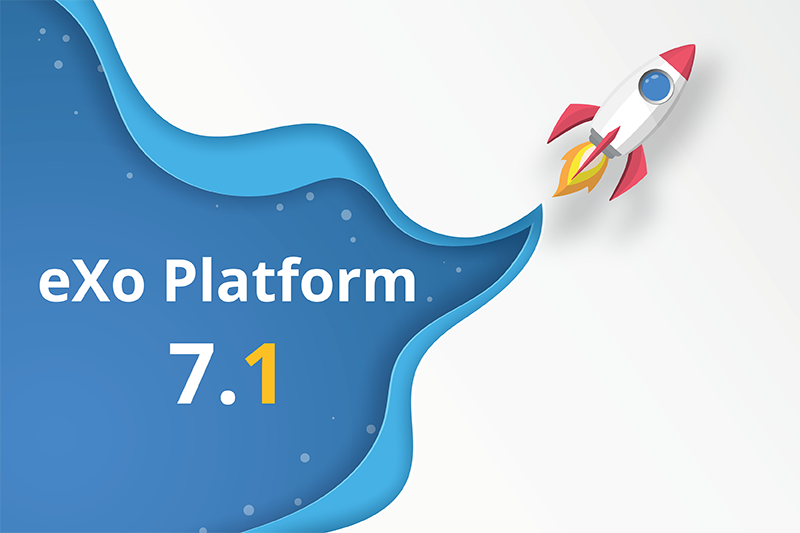- Fares Laroui
- October 10, 2019
How to use forums in eXo Platform
This blog post is for you if you are an eXo Platform 5 user or a prior version looking to learn more about forums and how they are used
Facilitating communication, collaboration and access to information represent the main goals of a digital workplace solution. Different features are implemented to achieve these goals from integrated chat applications, collaborative groups, forums and many more.

Content
Ever since the introduction of the internet a couple of decades ago, internet forums have been the application of choice for individuals or communities looking to exchange information, knowledge and communicate on shared interests.
In its simplest form, a forum is a web application designed for group discussions and user-generated content in which participants with common interests can exchange their opinions on a subject.
Although it may be considered as an old way to communicate especially with the emergence of new technologies like chat applications, forums have not lost their mojo just yet. To the contrary, with sites like Reddit and Quora, forums are still popular among communities of all ages thanks to their capacity to put communities together and help individuals find answers to their most recurrent questions.
Here at eXo, we value the role of internal communities to help businesses achieve their goals. This is why, forums have been in the heart of our solution ever since its inception and is continuously updated with each new version.
In previous blog posts, we covered social features like the chat application, collaborative features with space templates and many more.
Below we will take a tour of forums, explain their purpose and how they can be used effectively.
This blog post is for you if you are an eXo Platform user looking to learn more about forums and how they are used.
The Forums application is one of the most important pillars in eXo Platform. It allows our client and member of our online community to communicate, share knowledge and get in touch with our support team. For example, an end user of our community or enterprise edition can initiate contact with eXo Platform’s support team by creating a topic regarding a specific issue. The support team will instantly get notified and take the necessary actions to resolve the issue.
Within the forums application, we can distinguish between three types of users:
Regular uses
A regular user is an end user with limited access permissions and actions that include creating topics and posts, subscribing, using BBCode, or changing user settings. A regular user has User and Action bars with basic actions.

These actions include:
Topics
Regular users have the possibility to create, edit, rate and tag topics. Once the user accesses the forums application, he/she can create a topic by clicking on “Start Topic”. Then he/she will be asked to provide a title, add a brief description and attach files.
For example, John has just joined his new company and is looking for cool places for lunch. All he has to do is join a forum category called “Tips”, create a new topic and type his message. Then users can provide him with suitable recommendations.

Extra properties can be added to the topic with users able to manage access permissions and to close, lock and stick the topic.


Replies
Regular users are able to reply to topics as long as the topic is not closed and restricted. To post a reply, the user has to select the topic he/she wants to reply to. Multiple ways are available to reply to a topic. The user can Type a message in the Quick Reply box at the bottom of the topic, Reply with a quote or
Post a private reply.

Private messages
Users can send private messages to the topic creator. All they have to do is select the username or avatar of the user, then select Send Private Message from the drop-down menu.
The private message form will appear in which the user will be asked to enter the username of the recipient and compose the message.
For example, John came across a topic on the forum created by Adam “a designer”. He can directly reply to the topic or send a private message within the forum application to schedule a meeting with Adam to discuss the new feature in more details.

Bookmarks
This functionality allows users to save links to specific categories, forums or topics so they can return directly to them when needed. To bookmark an object, users have to access the (category, forum or topic) and then click on “Bookmarks” on the action bar.
Bookmarks can be accessed by clicking on “Bookmarks” on the User bar. My Bookmarks form will appear containing all the list of bookmarked links.
For example, John is particularly intersted in topics that revolve around integrations and applications within eXo Platform. He can bookmark the related topics and stay up to date with the latest posts.

Subscribe to RSS feed
This function is for all users to subscribe to a specific category, forum or topic. If there are any changes, the feed of the subscribed object will be updated. To get the RSS feed, click on the RSS icon on the Action bar.
Similar in a way to bookmarks, John can subscribe to feeds like eXo Platform integrations etc and read the RSS feed with an RSS feed reader.
Watch
This function allows users to keep track of changes in categories, forums or topics via email notifications. Whenever there are new changes, such as new categories, topics or posts created, the user will receive a notification. To activate this function, the user has to select a specific object and click on “Watch” on the Action bar.
User settings
The user settings allow users to change their profile information, set their preferences and manage their subscriptions.
For example, John can add a brief description of himself detailing the kind of categories and topics he is interested in.

Moderators
A moderator is a user with advanced permissions settings and actions including: moderating forums/topics/posts, viewing all pending moderation tasks, or banning IPs. A moderator has User and Action bars with a sub-set of certain capabilities.Moderators are responsible for managing content of posts and replies before and after they are posted to the category where they are assigned as moderators.

Moderators can assess forums, topics, posts, view all pending moderation tasks and ban IPs. They have advanced permission settings that allow them to take actions whenever a piece of content is not compliant with the specific guidelines.
Administrators
Platform administrators have advanced tasks including setting up the Forum portlet, managing categories/forums/users and other administrative tasks. An administrator has the Administration bar which is basically the User bar with more administrative actions. An Action bar is also available for administrators with advanced actions on forums and categories. Most of management tasks are shown via these bars.

Forums use cases in eXo Platform
As one of the main features in eXo Platform, forums are extensively used by our teams to communicate and share knowledge. It is also used by our online community and clients to get in touch with our support team to report some issues and suggest further improvements to our product.
For example, forums are used internally to vote for additional training required by engineers. A poll can be created and users are able to vote for the training sessions they need most to enhance their skills.

Our online community “the tribe”, is a perfect example to showcase the importance of forums. With 120.000 users, the forums application represent the point of contact between the community and our support team. Our support team is instantly notified when a user reports an issue or makes a recommendation and they can either reply directly or send a private message.
In this blog post we have covered the main features of the forums application. If you would like to learn more about forums and other applications make sure to join our online community and subscribe to our newsletter to get the latest news.
eXo Platform 6 Free Datasheet
Download the eXo Platform 6 Datasheet and
discover all the features and benefits
discover all the features and benefits
I am a product marketing specialist at eXo. My role is to assist marketing and sales teams in their operations and present our digital workplace solution to the world. I mainly blog about the latest tech trends, digital transformation, internal communication and how to navigate through eXo Platform.
Related posts
- All
- eXo
- Digital workplace
- Employee engagement
- Open source
- Future of work
- Internal communication
- Collaboration
- News
- intranet
- workplace
- Knowledge management
- Employee experience
- Employee productivity
- onboarding
- Employee recognition
- Change management
- Cartoon
- Digital transformation
- Infographic
- Remote work
- Industry trends
- Product News
- Thought leadership
- Tips & Tricks
- Tutorial
- Uncategorized
Leave a Reply
( Your e-mail address will not be published)
Connexion
0 Comments
Commentaires en ligne
Afficher tous les commentaires


